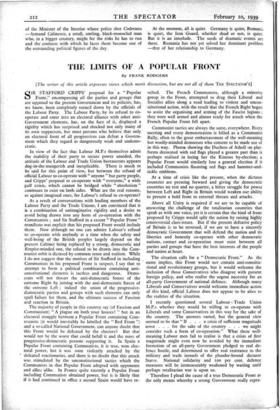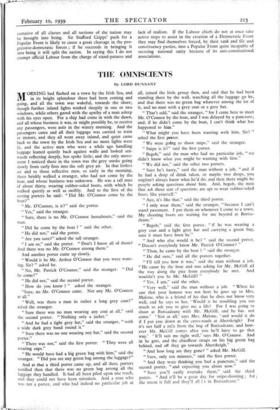THE LIMITS OF A POPULAR FRONT
By FRANK RODGER'S
[The writer of this article expresses views which merit discussion, but are not all of them THE SPECTATOR'S] SIR STAFFORD CRIPPS' proposal for a "Popular Front," encompassing all the parties and groups that are opposed to the present Government and its policies, has, we know, been completely turned down by the officials of the Labour Party. The Labour Party, by its refusal to co- operate and enter into an electoral alliance with other anti- Government elements, has, on the face of it, displayed a rigidity which has surprised and shocked not only many of its own supporters, but most persons who believe that only an electoral front of all progressives can defeat a Govern- ment which they regard as dangerously weak and undemo- cratic.
In view of the fact that Labour M.P.s themselves admit the inability of their party to secure power unaided, the attitude of the Labour and Trade Union bureaucrats appears dog-in-the-mangerish and inexplicable. There is much to be said for this point of view, but between the refusal of official Labour to co-operate with" anyone " but party people, and Cripps' proposal to co-operate with "everyone," a wide gulf exists, which cannot be bridged while " absolutism " continues to exist on both sides. What are the real reasons, as against imagined ones, for Labour's refusal to co-operate?
As a result of conversations with leading members of the Labour Party and the Trade Unions, I am convinced that it is a combination of unimaginative rigidity and a desire to avoid being drawn into any form of co-operation with the Communists ; and Sir Stafford in a recent "Popular Front" manifesto was explicit that his proposed Front would include them. Now although no one can admire Labour's refusal to co-operate with anybody at a time when the safety and well-being of the British peoples largely depend on the present Cabinet being replaced by a strong, democratic and Empire-minded one, the refusal to be drawn into the Com- munist orbit is dictated by common sense and realism. While I do not suggest that the motives of Sir Stafford in including Communists in his proposed Front is suspect, I say that to - attempt to form a political combination containing anti- constitutional elements is tactless and dangerous. Demo- , crats will not thwart the anti-democratic forces of the extreme Right by joining with the anti-democratic forces of the extreme Left ; indeed the union of the progressive- democratic parties and groups with such elements can only spell failure for them, and the ultimate success of Fascism and reaction in Britain.
The majority of people in this country say (of Fascism and Communism) "A plague on both your houses! " but in an electoral struggle between a Popular Front containing Com- munists (it would inevitably be labelled the "Red Front ") and a so-called National Government, can anyone doubt that this Front would be defeated by the electors? But that would not be the worst that could befall it and the mass of progressive-democratic persons supporting it. In Spain a Popular Front containing Communists, it is true, won elec- toral power, but it was soon violently attacked by the defeated reactionaries, and there is no doubt that this attack was stimulated by the unconstitutional tactics which the Communists in that Popular Front adopted with opponents and allies alike. In France quite recently a Popular Front including Communists obtained power, but it is likely that if it bad continued in office a second Spain would have re- suited. The French Communists, although a minority group in the Front, attempted to drag their Liberal and Socialist allies along a road leading to violent and uncon- stitutional action, with the result that the French Right began to assist the organising- and arming of the Fascist legions ; they were well armed and almost ready for attack when the French Popular Front fell apart.
Communist tactics are always the same, everywhere. Every meeting and every demonstration is billed as a Communist Rally, often to the great embarrassment of the well-meaning but woolly-minded democrats who consent to be made use of in this way. Photos showing the Duchess of Atholl on plat- forms decorated with red flags played a greater part than is perhaps realised in losing her the Kinross by-election; a Popular Front would similarly lose a general election if it included Communists flaunting red flags and hammer-and- sickle emblems.
At a time of crisis like the present, when the dictator countries are pressing forward and giving the democratic countries no rest and no quarter, a bitter struggle for power between Left and Right in Britain would weaken our ability to present a bold front to external threats and attacks.
Above all Unity is required if we are to be capable of answering the challenge of the totalitarian countries that speak as with one voice, yet it is certain that the kind of front proposed by Cripps would split the nation by raising highly controversial class-issues. But if the present defeatist policy of Britain is to be reversed, if we are to have a sincerely democratic Government that wilt-defend the nation and its liberties and honestly co-operate with other democratic nations, contact and co-operation must exist between all parties and groups that have the best interests of the people and nation at heart.
The situation calls for a "Democratic Front." As the name implies, this Front would not contain anti-constitu- tional and revolutionary groups, but it would welcome the inclusion of those Conservatives who disagree with present foreign policy, and who realise the urgent necessity for an all-party Government of national defence. Although many Liberals and Conservatives would welcome immediate action of this kind, official Labour does not appear to be alive to the realities of the situation.
I recently questioned several Labour - Trade Union M.P.s whether they would be willing to co-operate with Liberals and some Conservatives in this way for the sake of the country. The answers varied, but the general view seemed to be that " if . . . a crisis of sufficient magnitude arose . . . for the sake of the country . . . we might consider such a form of co-Operation." What these- well- meaning Labour men fail to realise is that a crisis of first magnitude might even now be avoided by the immediate formation of an all-party Government pledged to real de- fence hustle, and determined to offer real resistance to the military and trade inroads of the plunder-bound dictator States. National solidarity and too per cent. defence measures will be immeasurably weakened by wailing until perhaps totalitarian war is upon us.
Therefore I plead the cause of a true Democratic Front as the only means whereby a strong Government really repre- sentative of all classes and all sections of the nation may be brought into being. Sir Stafford Cripps' push for a Popular Front is likely to cause a great cleavage in the pro- gressive-democratic forces ; if he succeeds in bringing it into being it will split the nation. In saying this I do not exempt official Labour from the charge of stand-patness and lack of realism. If the Labour chiefs do not at once take active steps to assist in the creation of a Democratic Front they may find themselves forced, by their rank and file and constituency parties, into a Popular Front quite incapable of securing national unity because of its anti-constitutional associations.















































 Previous page
Previous page